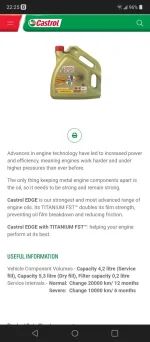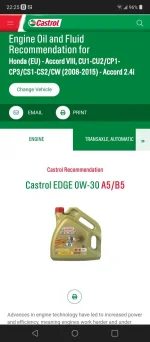The latter? Think you mean former. And it would have to be super cold during a cold start-up to perceive a difference in engine crank over speed between a 0W and a 5W.depends on how cold it is, if you are running a 0w20 vs 5w20 the latter may flow faster.
You are using an out of date browser. It may not display this or other websites correctly.
You should upgrade or use an alternative browser.
You should upgrade or use an alternative browser.
Talk Some Sense into an Oil Thickie?
- Thread starter Palut
- Start date
0W-xx oils are becoming the new darling of CAFE, because the real goal of the 0W oil is to use a hair less fuel during the engine warm-up stage - regardless of how cold it is outside. Yes, engine manufactuers are going that far to help them meet the ever increasing CAFE goals.At what temp gradient does 0 reach 5 compared to 5W20. Who overloads an engine while it`s warming. Not sure this 0 grade is all it`s purported to be. Will look for some studies on this subject.
Last edited:
While I absolutely agree with your first statement, I'm not so sure about the rest. Red Line (thanks, Red Line!) lists these specs for their own oils:More important is film thickness and oxidation resistance. The difference in “flow” is negligible especially at operating temperature.
0W-30 Vis@100C, Cst 11.9
0W-20 Vis@100C, Cst 9.1
The 2.8 difference in viscosity between the two means the 0W-30 oil is 31% more viscous at full operating temperature than the 0W-20 oil. To me, this just doesn't seem 'negligible' as you say. But even if it is negligible, it still means the oil flow through the turbo will be reduced to some extent with the 0W30. Why lose the advantage of better flow? If the 0W-20 offers more than adequate lubricity, film strength, oxidative resistance, etc., why not get the added perk of better oil flow and cooling for the turbo (and not just the turbo - ALL the bearing surfaces in the engine)?
While I absolutely agree with your first statement, I'm not so sure about the rest. Red Line (thanks, Red Line!) lists these specs for their own oils:
0W-30 Vis@100C, Cst 11.9
0W-20 Vis@100C, Cst 9.1
The 2.8 difference in viscosity between the two means the 0W-30 oil is 31% more viscous at full operating temperature than the 0W-20 oil. To me, this just doesn't seem 'negligible' as you say. But even if it is negligible, it still means the oil flow through the turbo will be reduced to some extent with the 0W30. Why lose the advantage of better flow? If the 0W-20 offers more than adequate lubricity, film strength, oxidative resistance, etc., why not get the added perk of better oil flow and cooling for the turbo (and not just the turbo - ALL the bearing surfaces in the engine)?
| Viscosity, cSt (ASTM D445) | |
| @ 40 ºC | 80 |
| @ 100 ºC | 13.7 |
| Viscosity Index | 176 |
Those bearings aren’t lubricated by gravity flow. And besides, flow doesn’t lubricate, the MOFT does. So an oil with a higher HT/HS and greater film thickness protects better.While I absolutely agree with your first statement, I'm not so sure about the rest. Red Line (thanks, Red Line!) lists these specs for their own oils:
0W-30 Vis@100C, Cst 11.9
0W-20 Vis@100C, Cst 9.1
The 2.8 difference in viscosity between the two means the 0W-30 oil is 31% more viscous at full operating temperature than the 0W-20 oil. To me, this just doesn't seem 'negligible' as you say. But even if it is negligible, it still means the oil flow through the turbo will be reduced to some extent with the 0W30. Why lose the advantage of better flow? If the 0W-20 offers more than adequate lubricity, film strength, oxidative resistance, etc., why not get the added perk of better oil flow and cooling for the turbo (and not just the turbo - ALL the bearing surfaces in the engine)?
Other than slightly increased fuel economy there is no benefit to thinner oils.
The bottom line for me is could I reasonably expect that my engine, with everything else being equal, last appreciably longer were I to run xx-30 or xx-40 weight oil?
Maybe.
Maybe not.
OVERKILL
$100 Site Donor 2021
Oil pumps are positive displacement. This means that as long as they aren't on the relief, for all intents and purposes, they displace the same volume of oil per rotation regardless of viscosity. So, your oil flow through the turbo is the same, regardless of that viscosity, but, as @kschachn noted, the oil with the greater HTHS will have a greater MOFT.While I absolutely agree with your first statement, I'm not so sure about the rest. Red Line (thanks, Red Line!) lists these specs for their own oils:
0W-30 Vis@100C, Cst 11.9
0W-20 Vis@100C, Cst 9.1
The 2.8 difference in viscosity between the two means the 0W-30 oil is 31% more viscous at full operating temperature than the 0W-20 oil. To me, this just doesn't seem 'negligible' as you say. But even if it is negligible, it still means the oil flow through the turbo will be reduced to some extent with the 0W30. Why lose the advantage of better flow? If the 0W-20 offers more than adequate lubricity, film strength, oxidative resistance, etc., why not get the added perk of better oil flow and cooling for the turbo (and not just the turbo - ALL the bearing surfaces in the engine)?
If you think the difference at 100C is significant, you should see what the viscosity is below 0C. A 6cSt PAO base oil is 7,800cSt @-40C.
As I've said many times, the PD oil pump and how it lubricates an engine's oiling system seems to be a very misunderstood thing.Oil pumps are positive displacement. This means that as long as they aren't on the relief, for all intents and purposes, they displace the same volume of oil per rotation regardless of viscosity. So, your oil flow through the turbo is the same, regardless of that viscosity ...
I for sure don’t understand itAs I've said many times, the PD oil pump and how it lubricates an engine's oiling system seems to be a very misunderstood thing.
No you're smart and your engine will thank you when it's not burning oil at 100k. A high HTHS ACEA C3 oil would work perfectly for your application.Can you talk some sense into me? I recently bought a 2023 Acura Integra, basically Acura's version of the Civic Si. I've got 900 miles on it and am thinking of doing the first oil change this weekend. I just can't wrap my mind around using 0W-20 in a turbocharged engine that will see a lot of high revs.
I joined this site in 2003 and always watched the 20 weight debates from afar. This is the first time I've ever had to run a 20 weight, now I'm conflicted! I know that millions of engines have lived long and productive lives on 0W-20, and that this Honda L15CA may have been designed with 0W-20 in mind. But I also know that I will drive this harder than a typical commuter, and that the EPA requires them to state that only 0W-20 should be used, regardless of what the engineers would prefer, and that thicker oils are specified in other markets that don't have this EPA requirement.
As of right now I'm planning to find a fully synthetic SP rated 0W-30, with the highest HTHS and lowest NOACK numbers I can find. Am I crazy?
Yeah, like -40°F a 5w or even 10w will work fine for most North American winters. The reason many OEMs spec 0w is to ensure a synthetic oil is used, and for the very tiny increase in cold weather startup fuel economy.The latter? Think you mean former. And it would have to be super cold during a cold start-up to perceive a difference in engine crank over speed between a 0W and a 5W.
OVERKILL
$100 Site Donor 2021
CCS visc for a 5W-xx is tested at -30C and it's noticeable there, particularly if the oil's cold temp performance has degraded in service, which it is allowed to do.Yeah, like -40°F a 5w or even 10w will work fine for most North American winters. The reason many OEMs spec 0w is to ensure a synthetic oil is used, and for the very tiny increase in cold weather startup fuel economy.
Redline 0w20 w Hths 2.9. That's thick!Just run a "thick" 0w-20. PUP 0w-20.
- Joined
- Feb 6, 2021
- Messages
- 1,412
^^^ That, it really had to be super cold. For me, no point in running a 5w or 0w when 15w40 is considerably cheaper where I live. I pay like 11 dollars for a gallon of GTX 15w40.And it would have to be super cold during a cold start-up to perceive a difference in engine crank over speed between a 0W and a 5W.
It was over 102* today here. Since I moved from the 0w20 to the 30wt, I haven't had the consumption from the low tension piston rings and GDI fuel diluted issues. Going 10,000 miles and now I am in under a quart of top off. I would also say that I don't think a 0w20 remains that through an entire oci interval especially with the L15 1.5 T-GDi. What I can presume is that the general 30wt will get diluted to a 20w after 5-7k miles. For all those who are driving commercial,track, delivery,etc..these are severe operations and might need a thicker, sturdier oil to fit your need. I hear everyone saying that thinner oil gets into the galleries and bearing quicker BUT they will also get flung out of them faster too. I seen too many Hyundai cars with a very tolerant owners manual allow usually a 20wt - 30wt oil. They simply want it changed often.
Attachments
The oil volume force fed to all the areas of the engine by the oil pump will basically be the same as long as the pump isn't in pressure relief. Journal bearings will "self pump" oil volume through them as they rotate (nature of a journal bearing), and the pump supply pressure feeding them will force more volume through a bearing than it naturally flows from roration. A thicker oil will always give more MOFT in the bearings, all other factors being constant. Again, the operation of a PD oil pump and how it supplies oil to the engine is key, as well how the oil MOFT behaves between various components moving against each other.I hear everyone saying that thinner oil gets into the galleries and bearing quicker BUT they will also get flung out of them faster too.
You said it best, 0w20 has been out a LONG time now with many successful miles tracked. The proof is in the pudding. Keep it full of the proper spec oil and change at the appropriate intervals and you should see long life from that engine. Enjoy!
Palut
Thread starter
Thank you all for your input. I'm planning to put some M1 5W-30 Extended Performance in on Sunday.
I've still got M1 0W-40 and Pennzoil Platinum 0W-40 left over that was intended for my old WRX. Maybe they'll make a good summer oil...
I've still got M1 0W-40 and Pennzoil Platinum 0W-40 left over that was intended for my old WRX. Maybe they'll make a good summer oil...
In my Opinion, all this Disscussions are a little bit pointless because we dont have the values for the bearing clearances of the crankshaft and Rod bearings from the Workshop manual and compare them with other engines.
We had this discussion here a few months (a year?) ago. My car, wich calls for 10w-30, had the same clerances as all my motorcycles wich use 10w-40 to 10w-50 according to the OEM workshop manuals.
We had this discussion here a few months (a year?) ago. My car, wich calls for 10w-30, had the same clerances as all my motorcycles wich use 10w-40 to 10w-50 according to the OEM workshop manuals.
Last edited:
Good summer oil just how many times have you seen -30 on the wetside in Washington?Thank you all for your input. I'm planning to put some M1 5W-30 Extended Performance in on Sunday.
I've still got M1 0W-40 and Pennzoil Platinum 0W-40 left over that was intended for my old WRX. Maybe they'll make a good summer oil...
Similar threads
- Replies
- 1
- Views
- 702
- Replies
- 15
- Views
- 2K
- Replies
- 38
- Views
- 2K
- Replies
- 33
- Views
- 2K




